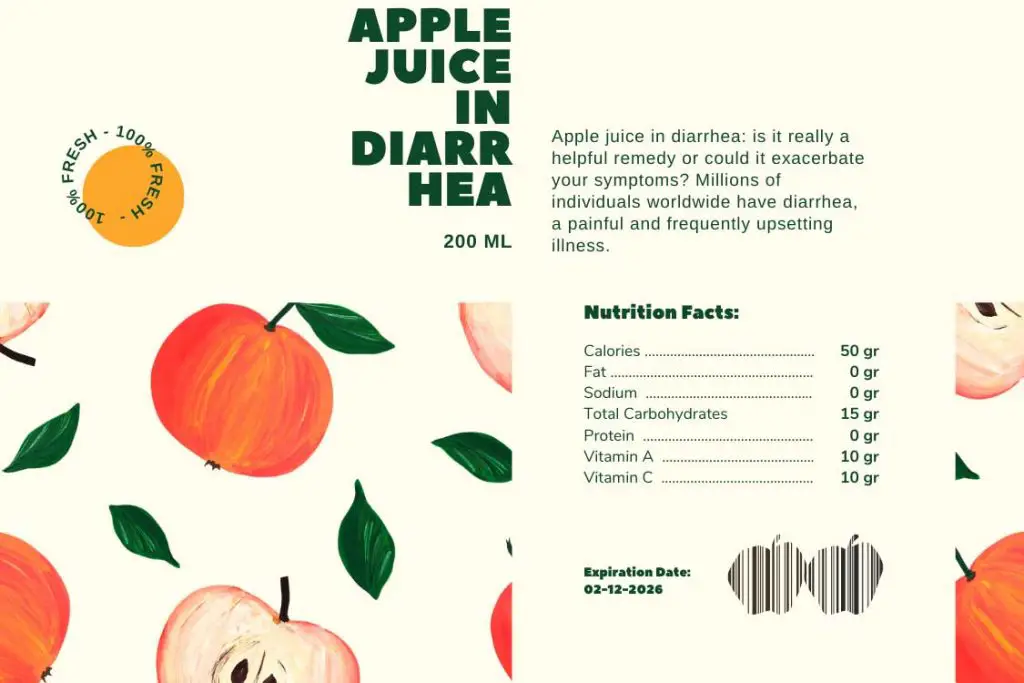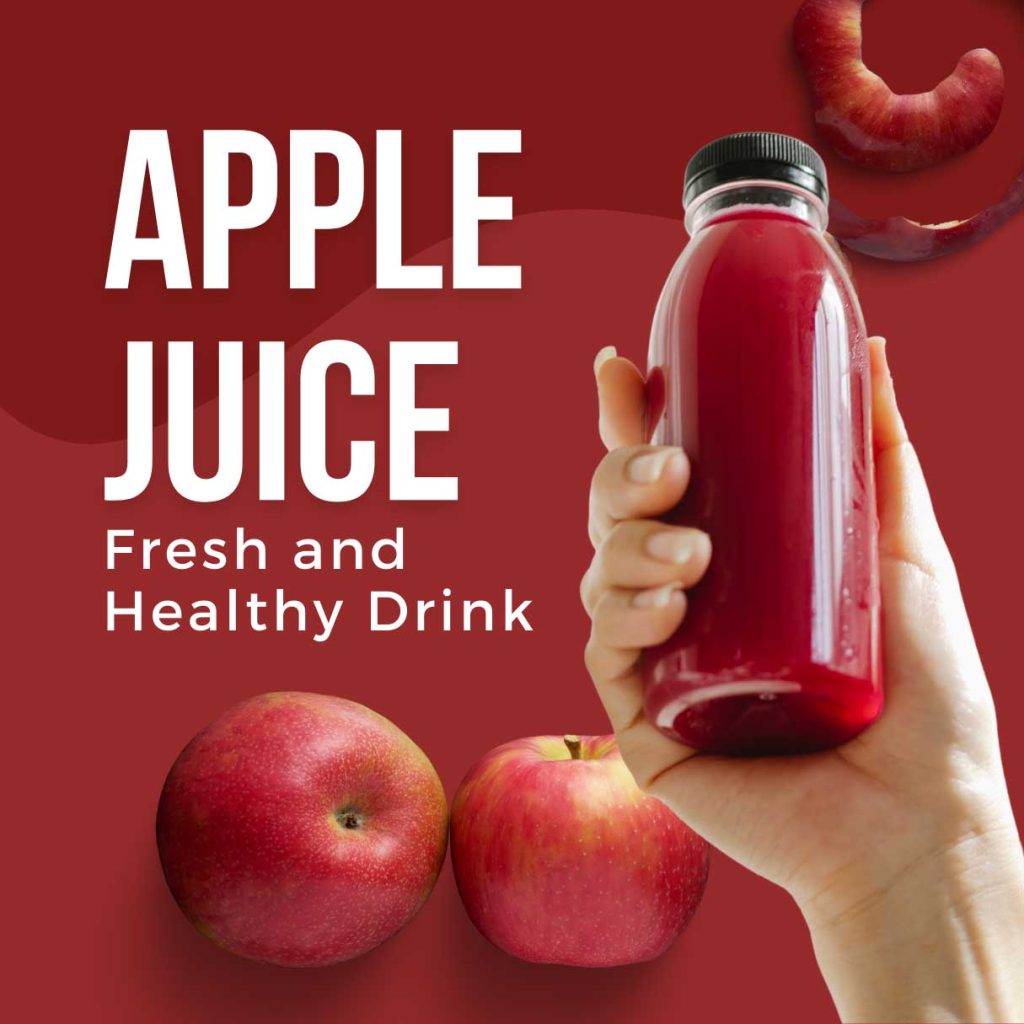Apple juice in diarrhea: is it really a helpful remedy or could it exacerbate your symptoms? Millions of individuals worldwide have diarrhea, a painful and frequently upsetting illness. Either food, an illness, or long-term gastrointestinal problems can cause diarrhea; comfort and health depend on how well it is managed.
This article will examine apple juice’s advantages and disadvantages as a possible diarrhea therapy. Knowing how your digestive system reacts to apple juice may help you decide whether it’s a good fit for your circumstances.
Understanding Diarrhea: Causes and Symptoms
Millions of individuals suffer from diarrhea, a prevalent illness. It is usually characterized by the frequent passage of loose or watery feces, which can be painful and interfere with day-to-day activities. Effective management and treatment of diarrhea depend critically on knowing the causes and identifying the symptoms.
Causes of Diarrhea
Many things may induce diarrhea, and each one affects the digestive system in a different way:
Infections: the most common cause, can result from bacterial, viral, or parasitic infections. Viral diseases like the rotavirus and norovirus are common offenders, particularly in young and elderly people.
Foods and Allergies: Eating anything that upsets the digestive tract can cause diarrhea. This covers food allergies as well as lactose intolerance.
Drugs: Diarrhea can result from certain drugs, such as antibiotics, which disturb the normal balance of germs in your stomach.
Chronic Diseases: Chronic diarrhea is a well-recognized symptom of disorders like Crohn’s disease, ulcerative colitis, and irritable bowel syndrome (IBS).
Functional Bowel Disorders: The bowel may not function properly at times, even when it appears to be normal. This may lead to persistent diarrhea.
Symptoms of Diarrhea
The primary symptom of diarrhea is the frequent passage of loose, watery stools. Other associated symptoms include:
- Abdominal cramps
- Bloating
- Urgency to have a bowel movement
- Nausea and vomiting
- Fever
- Dehydration, which may manifest as thirst, less frequent urination, dry skin, fatigue, and light-headedness.

Summary Table: Causes and Symptoms of Diarrhea
| Cause | Common Examples | Symptoms |
|---|---|---|
| Infections | Viruses (norovirus, rotavirus), bacteria, parasites | Watery stools, fever, vomiting |
| Diet and Allergies | Lactose intolerance, food allergies | Loose stools, bloating, gas |
| Medications | Antibiotics, cancer therapies | Frequent loose stools, cramps |
| Chronic Diseases | Crohn’s disease, ulcerative colitis, IBS | Chronic diarrhea, abdominal pain |
| Functional Disorders | Functional bowel disorders | Chronic loose stools, abdominal discomfort |
Millions of individuals worldwide suffer from diarrhea, a frequent intestinal problem. It is usually accompanied by frequent, loose, or watery feces, and it may occasionally indicate more significant health issues, even though it is usually moderate and transient.
Hospitals
Gastroenteritis, a viral, bacterial, or parasitic infection, frequently causes diarrhea. Viral diseases such as rotavirus and norovirus are quite common, especially among youngsters and the elderly.
Drinking tainted food or water can lead to bacterial infections caused by Salmonella, E. coli, and Campylobacter. Water in areas with inadequate sanitation can contract parasites like Giardia.
Food allergies and intolerances
Another reason diarrhea may occur is a reaction to specific foods to which a person is allergic or intolerant. Lactose intolerance is a common example, where the body struggles to digest the lactose present in dairy products.
Additionally, upsetting regular digestion and resulting in diarrhea are other dietary allergies and intolerances.
Herbals
Diarrhea is a side effect of many drugs. Antibiotics’ proven ability to upset the gut’s balance of beneficial and harmful microorganisms can cause diarrhea. Other medications such as nonsteroidal anti-inflammatory medicines (NSAIDs), cancer treatments, and magnesium-containing antacids can also cause similar problems.
Diseases of the Digestive
Chronic digestive disorders such as Crohn’s disease, ulcerative colitis, and irritable bowel syndrome (IBS) often lead to dehydration. Because of the inflammation and irritation these disorders cause in the gastrointestinal tract, diarrhea frequently follows.
Disorders of the Functional Bowel
Sometimes testing is insufficient to identify the exact cause of a person’s diarrhea. Changes in the sensitivity or motility of the stomach are believed to cause functional diarrhea.
How Apple Juice Can Help With Diarrhea?
Getting enough water is essential when you have diarrhea. Especially among kids who may be picky about their fluid intake, apple juice, with its delicious flavor and hydrating qualities, can help manage moderate diarrhea.
A small amount of pectin, a kind of soluble fiber, is present in apple juice and may help the intestines absorb extra liquid, therefore stabilizing the stools. The natural sugars in apple juice, such as fructose, can offer a rapid energy boost that can be helpful when diarrhea weakens the body.
To be sure, use apple juice sparingly. Regular apple juice has a lot of sugar, which can sometimes make diarrhea symptoms worse, even though it can help rehydrate and supply nutrients. Therefore, experts typically recommend diluting apple juice with water or selecting a clear apple juice that contains fewer sugars and particulates to avoid aggravating a sensitive digestive system.
To determine tolerance, people thinking about including apple juice in their diarrhea treatment regimens should begin with small doses. If symptoms do not improve or worsen, it is advisable to stop using the juice and consult a physician.
Apple juice, while beneficial in mild cases, should not replace expert medical care or more effective rehydration solutions such as oral rehydration salts, particularly in more severe cases.

Je m’appelle Gunther Adam et je suis ravi de partager avec vous le monde des saveurs vibrantes, de la vie saine et de l’art du goût. Learn More




